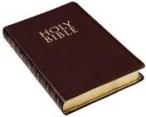 TUESDAY 15TH AUGUST 2017 MORNING
TUESDAY 15TH AUGUST 2017 MORNING
Ecclesiastes 7:3-11 New International Version (NIV)
3 Frustration is better than laughter,
because a sad face is good for the heart.
4 The heart of the wise is in the house of mourning,
but the heart of fools is in the house of pleasure.
5 It is better to heed the rebuke of a wise person
than to listen to the song of fools.
6 Like the crackling of thorns under the pot,
so is the laughter of fools.
This too is meaningless.
7 Extortion turns a wise person into a fool,
and a bribe corrupts the heart.
8 The end of a matter is better than its beginning,
and patience is better than pride.
9 Do not be quickly provoked in your spirit,
for anger resides in the lap of fools.
10 Do not say, “Why were the old days better than these?”
For it is not wise to ask such questions.
11 Wisdom, like an inheritance, is a good thing
and benefits those who see the sun.
The Book of Ecclesiastes, like the Book of Proverbs, is part of the Wisdom Literature in the Bible believed to have been written by King Solomon. It contains his observations on life and comments about how we should live.
The emphasis in the above verses is on the benefits of wisdom and learning from experiences in life. It seems to suggest that we learn more from sad experiences than from happy ones.
God is not mentioned in these verses. As Christians we know that all true wisdom comes from God. God can teach us wisdom through the events in our lives but we should always ask God for wisdom and guidance so that we make the right decisions.
![]()
 JUMANNE TAREHE 15 AGOSTI 2017 ASUBUHI
JUMANNE TAREHE 15 AGOSTI 2017 ASUBUHI
MHUBIRI 7:3-11
3 Huzuni ni afadhali kuliko kicheko, Maana simanzi ya uso ni faida ya moyo.
4 Moyo wake mwenye hekima umo nyumbani mwa matanga, bali moyo wake mpumbavu umo nyumbani mwa furaha.
5 Heri kusikia laumu ya wenye hekima, Kuliko mtu kusikia wimbo wa wapumbavu;
6 Maana kama mlio wa miiba chini ya sufuria, Ndivyo kilivyo kicheko cha mpumbavu. Hayo nayo ni ubatili.
7 Kweli jeuri humpumbaza mwenye hekima, Na rushwa huuharibu ufahamu.
8 Heri mwisho wa neno kuliko mwanzo wake, Na mvumilivu rohoni kuliko mwenye roho ya kiburi.
9 Usifanye haraka kukasirika rohoni mwako, Maana hasira hukaa kifuani mwa wapumbavu.
10 Usiseme, Kwani siku za kale kupita siku hizi? Maana si kwa hekima uulizavyo neno hilo.
11 Hekima ni njema, mfano wa urithi; Naam, nayo ni bora kwao walionao jua.
Kitabu hiki, kama kitabu cha Mithali, ni sehemu ya Maandishi ya Hekima, yanaaminika kuandikwa na Mfalme Sulemani. Kitabu hiki kinatoa uzoefu wa maisha ya Mfalme Sulemani na ushauri kwa maisha yetu. Mistari hii inaonyesha kwamba matukio ya huzuni katika maisha yetu yanaweza kutufundisha na kutupa hekima kuliko siku za furaha.
Mungu hatajwi katika mistari hii lakini sisi Wakristo tunajua kwamba hekima bora inatoka kwa Mungu. Tusitegemee tu hekima yetu na uzoefu wa maisha, bali tutafute hekima na muongozo kutoka kwa Mungu ili tufanye uchaguzi mwema katika maisha yetu.
![]()
